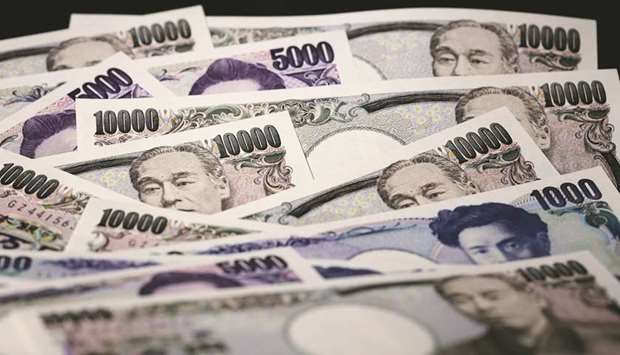The yen may strengthen to 100 per dollar as soon as next month if risks surrounding US politics or monetary policy prompt traders to cut short positions, Nomura Asset Management Co says.
Japan’s currency could appreciate to the strongest in a year if talks over the US debt-ceiling reach a deadlock or the Federal Reserve appears less intent on raising interest rates, said Shigeki Sakaki, chief strategist at the Tokyo-based firm that oversees $435bn. Speculators are positioned for the yen to weaken, with short positions near the highest since January 2014.
“Speculative yen-short positions are extremely high and the yen could be placed under tremendous pressure to strengthen if these are unwound,” Sakaki said in an interview last week. The dollar could easily fall to 100 yen if speculators start to buy back Japan’s currency, he said.
The yen has jumped 2.8% in the past month as political turmoil in the US sapped optimism President Donald Trump will be able to cut taxes and reflate the world’s largest economy. Japan is enjoying its longest economic expansion in a decade with gross domestic product increasing for a fifth quarter in the three months through March.
Japan’s new Economy Minister Toshimitsu Motegi said on Sunday that it’s important to raise the nation’s growth potential.
The economy may expand 1.4% in 2017, above its potential of about 0.8%, according to Bloomberg Intelligence.
September is looming as a crunch month for the dollar-yen pair with the Fed holding its next policy meeting on September 19-20, while the Treasury Department has warned Congress must raise US debt ceiling by September 29 to avoid a default.
“I’ve been expecting the dollar to fall to around 100 yen by the end of the year but it could happen much faster, possibly by September,” Sakaki said. The yen is likely to face volatility that month due to the Fed’s policy meeting and the debt-ceiling deadline, he said.
Other positives for the yen include one of the cheapest real effective exchange rates among major currencies, and Japan’s consistent current-account surplus, Sakaki said.
While most yen bears have cut back expectations of a Trump reflation trade, others are betting policy divergence between the Bank of Japan and its global peers will increase pressure on the currency. Goldman Sachs Asset Management has added to wagers for the dollar to strengthen on speculation the market is underpricing the pace of US rate increases.
Speculators boosted net yen short positions in the futures market to 126,919 in the week ended July 18, the most since the period through January 7, 2014. They cut them to 112,196 in the week through August 1. Japan’s currency will weaken to 114 per dollar by December 31, according to the median estimate in a Bloomberg survey of more than 70 analysts.
HSBC Holdings Plc is the only contributor forecasting it will end the year at 100.
The threat of further yen gains is unlikely to deter Japanese investors from buying US and European bonds as they search for higher yields, Sakaki said.
Japanese funds bought a net ¥4tn of foreign debt in the four weeks ended July 28, Ministry of Finance data show. That would be the largest monthly purchase since July 2016, based on separate figures from the MOF.
“Japanese investors may have to continue investing abroad due to a difference in monetary policy between Japan and other countries, but as they don’t want to take currency risks, they will invest in foreign bonds and increase currency hedges,” Sakaki said.

The yen may strengthen to 100 per dollar as soon as next month if risks surrounding US politics or monetary policy prompt traders to cut short positions, according to Nomura Asset Management Co
